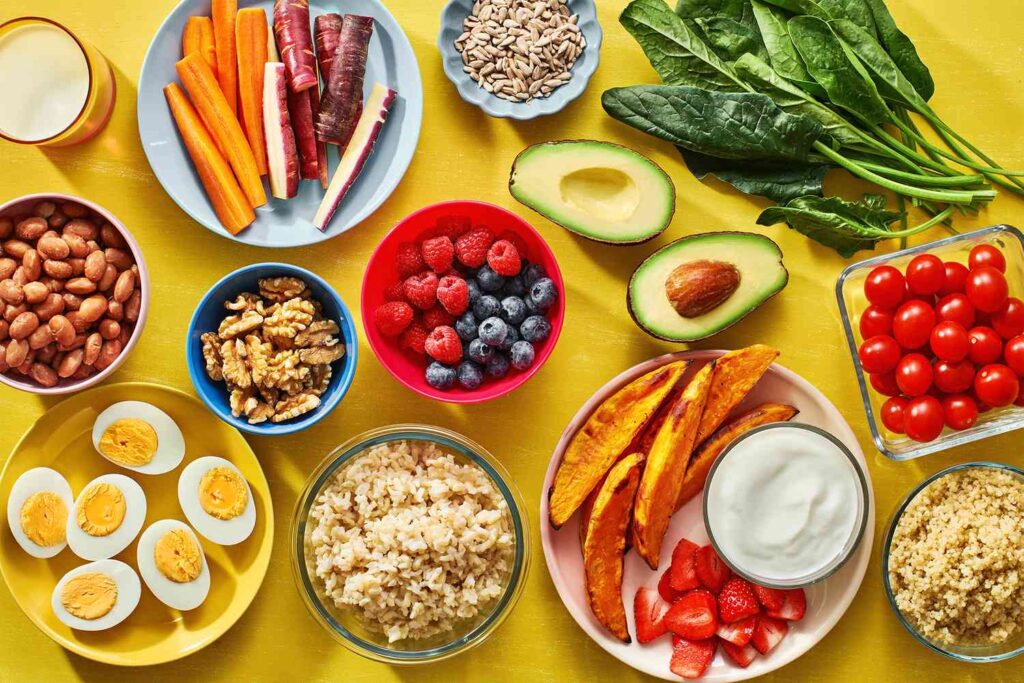Our skin is a reflection of our overall health, and what we eat plays a significant role in its appearance and condition. While skincare products are important, true radiance starts from within. A balanced diet rich in nutrients can support skin health, helping to prevent acne, delay signs of aging, and promote a clear, glowing complexion. Let’s explore how your diet can positively influence your skin and which foods you should consider incorporating into your daily meals for optimal skin health.
Understanding the Link Between Diet and Skin Health
The foods we consume provide the building blocks for healthy skin cells, collagen production, and protection against oxidative stress. Certain nutrients and antioxidants play key roles in maintaining skin integrity and reducing inflammation, which are crucial for combating acne, wrinkles, and other skin concerns.
Essential Nutrients for Healthy Skin
- Antioxidants: Found in fruits and vegetables, antioxidants like vitamins C and E, beta-carotene, and selenium help protect skin cells from damage caused by free radicals, promoting youthful and radiant skin.
- Omega-3 Fatty Acids: Found in fatty fish (salmon, sardines), flaxseeds, and walnuts, omega-3s help maintain skin hydration, reduce inflammation, and support skin barrier function.
- Vitamin A: Crucial for skin cell production and repair, vitamin A-rich foods like sweet potatoes, carrots, and leafy greens contribute to healthy skin turnover and can help prevent acne.
- Zinc: Supports skin healing and regulates oil production. Zinc can be found in lean meats, shellfish, seeds, and nuts.
- Hydration: Drinking an adequate amount of water (around 8 glasses per day) helps flush toxins from the body and keeps skin hydrated, plump, and resilient.
Foods to Include in Your Diet for Healthy Skin
- Fruits: Berries, oranges, and grapes are rich in antioxidants and vitamin C, which promote collagen production and protect against sun damage.
- Vegetables: Spinach, kale, and other leafy greens provide vitamins A, C, and E, as well as minerals like zinc and selenium.
- Fatty Fish: Salmon, mackerel, and trout are excellent sources of omega-3 fatty acids, which reduce inflammation and keep skin moisturized.
- Nuts and Seeds: Walnuts, almonds, and flaxseeds are packed with omega-3s, vitamin E, and zinc, supporting skin health and elasticity.
- Whole Grains: Opt for whole grains like brown rice, quinoa, and oats, which provide B vitamins and fiber, supporting overall skin health.
Foods to Limit or Avoid
- Processed Foods: High in sugar, refined carbohydrates, and unhealthy fats, processed foods can contribute to inflammation and exacerbate acne.
- Dairy Products: Some studies suggest a link between dairy consumption and acne, possibly due to hormones and growth factors present in milk.
- Sugary Foods and Beverages: High glycemic index foods can spike blood sugar levels, leading to inflammation and potentially worsening acne.
Practical Tips for Healthy Skin
- Eat a Variety of Foods: Aim for a balanced diet that includes a wide range of colorful fruits, vegetables, lean proteins, and whole grains.
- Moderation is Key: Enjoy treats occasionally, but focus on nutrient-dense foods that support skin health on a daily basis.
- Stay Hydrated: Drink water throughout the day to keep your skin hydrated and promote detoxification.
- Consider Supplements: If your diet lacks certain nutrients, consider supplements like omega-3s, vitamin D, or probiotics after consulting with a healthcare professional.
Conclusion
Your diet plays a crucial role in the health and appearance of your skin. By nourishing your body with nutrient-rich foods and adopting healthy eating habits, you can support radiant, clear skin from the inside out. Remember, skincare is not just about what you apply topically; it’s about the holistic care you provide to your body through your daily diet. Embrace these dietary tips and witness the transformative power of food on your skin’s vitality and glow.

